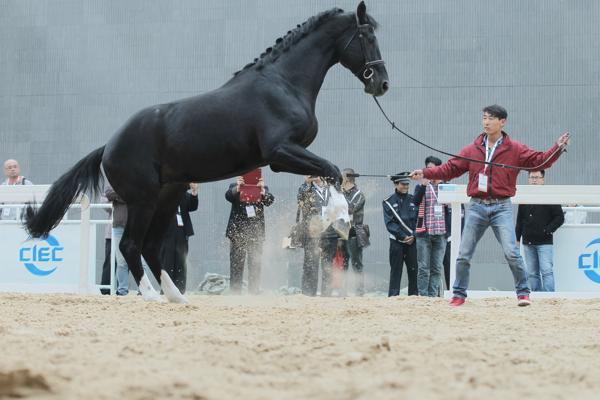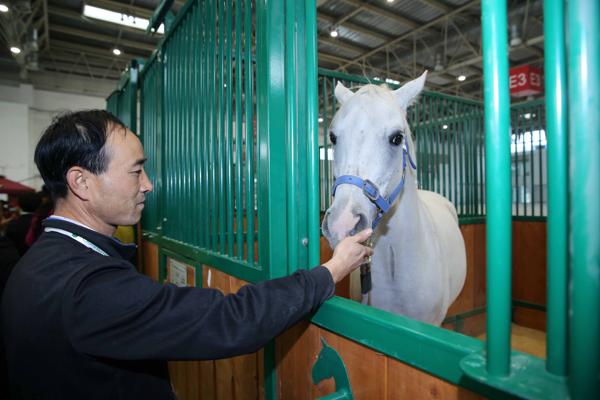
A trainer controls a horse at the China International Professional Horse Sports and Leisure Industries Exhibition in Beijing last year.[Photo by Wang Jing/China Daily]
Bai Ying’s stained apron and waterproof boots show equestrian ownership is not the preserve of the superrich.
The white-collar Beijinger cares for her horse at a stable in the capital’s Daxing district most mornings before work. (The ultra-wealthy pay others to do the dirty work.)
She bought the animal from the Inner Mongolia autonomous region’s Xilin Gol League for 30,000 yuan ($4,700) six months ago.
She pays Huanglin Horsemanship 2,000 yuan a month for maintenance.
Bai not only feeds the horse but also acclimatizes it to things such as switches and plastic bags wafting through the air. Critically, she establishes a rapport with the animal.
She rides it for about four hours on weekends.

An international equestrian expo held in Beijing last year attracted horse-riding lovers.[Photo by Chen Xiaogen/China Daily]
Bai decided to get her own horse after riding for nearly four years.
“You don’t pay attention to establishing a relationship with a horse when you start learning how to ride,” she says.
“But you can forge an intimate bond after you master the basics.”
Horses at public clubs encounter so many people that it is difficult to establish individual connections, Bai says.
Her horse comes when she calls it by name. And it is becoming more obedient, she says.
“It’s satisfying to see my efforts pay off and my horse respond.”
China is home to an estimated 5,000-10,000 private horse owners, says Wutzala, editor-in-chief of the Chinese equestrian-website Horse.org.cn and a Manchu.
The figure does not include breeders or intermediaries.
Most private horses are entrusted with the mainland’s roughly 500 clubs.
Each club averages 10-20 private horse owners. Most are in Beijing, and Hebei, Shandong and Zhejiang provinces.
“Most Chinese horse owners are rich,” Wutzala says.
Many buy for events. Some hope to show off wealth, he says.
About 2,000 horses have been imported annually since 2007.
Owners often visit countries such as Germany, France, Belgium and the Netherlands to buy horses for jumping events. Or they buy them in Portugal and Spain, for dressage, in which the horse and rider “perform from memory a series of predetermined movements”, according to the International Equestrian Federation’s definition.
Zhi Gang of Beijing embarked on a horse-hunting expedition to France six years ago.
“Pedigree and horsemanship are generally superior overseas,” Zhi says.
French horses’ stamina normally exceeds that of other countries’ horses, he says.
Zhi owns a dozen horses, and two of his imported breeds won first and third places at the International Equestrian Federation’s one-star endurance event in Chengde city in Hebei in June.
The event is over 80 kilometers. The one-star FEI-approved international competition covers 80-119 km a day.
Ultimately, buying a winner largely comes down to an educated guess.
“There are no standards to rely on,” Zhi says.
“I can only choose based on dealers’ advice about the pedigree and previous competition experience.”
Si Maming does not worry about endurance but, rather, about agility. Dressage is his focus.
The Beijing resident from Liaoning province’s capital, Shenyang, owns eight horses. Three come from Portugal and the rest from China.
“Foreign horses more easily establish relationships with humans,” he says.
One of his Portuguese equines appeared onstage during Liaoning TV’s Spring Festival Gala last year.
Si divides dressage into modern and classical. He prefers the latter.
“It resembles Chinese tai chi and explores a shared realm between human and horse. Horses should be encouraged, rather than forced, to move so they can best show their extraordinary talents.”
Si says interacting with horses has taught him patience.
Horse prices vary greatly.
Chinese breeds cost 10,000-100,000 yuan, while foreign breeds used for Olympic competitions can reach 16 million yuan, Wutzala says.
Another 100,000 yuan must be paid for international transport, tariffs and customs inspections.
The value of untrained horses is a tenth of that of trained ones of the same breed, he says.
Beijing clubs generally charge 3,000-5,000 yuan for maintenance but may charge as little as 2,000 yuan in the suburbs.
China’s horseback-riding industry has rapidly developed in the past two years.
“Over a million people a year ride on Hebei’s Bashang grassland now,” Wutzala says.
“Demand has also given rise to the horse-owning class.”
